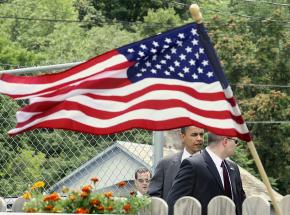An occupation by any other name
For supporters drawn to his pledge to withdraw from Iraq, Barack Obama's latest talk about "refining" his position has left them feeling betrayed.
AT SOME point this month, expect to wake up and find that Barack Obama has traveled to Baghdad's Green Zone to meet with Gen. David Petraeus, the man credited as the mastermind of the U.S. troop "surge" that finally "pacified" the stubborn Iraqi resistance to occupation.
In early July, Obama explained that his summer travels would take him to Iraq to meet with U.S. military commanders so he can "refine" his position on withdrawing U.S. troops from Iraq--in other words, retreat from the stand, perceived as "antiwar," that is probably most responsible for Obama's victory in the Democratic primaries.
Part of the reason for the trip is to put an end to squawking by John McCain that Obama hasn't visited Iraq in close to three years.
As if it's only possible to figure out whether to withdraw from Iraq by traveling there. And how much do heavily guarded, high-profile American political figures get to interact with ordinary Iraqis or observe what life is really like? The answer, of course, is not at all.
But the other reason for Obama's trip is for Petraeus to give him political cover for wriggling free of the perception that he's "too antiwar."
"I've always said that the pace of withdrawal would be dictated by the safety and security of our troops and the need to maintain stability," Obama told reporters in early July. "And when I go to Iraq and have a chance to talk to some of the commanders on the ground, I'm sure I'll have more information and will continue to refine my policies."
For supporters drawn to Obama's pledge to "end" the war he "opposed from the beginning," this latest shift has left them feeling betrayed. As one Oregon woman, a former Green who registered Democrat so she could vote for Obama in the primary election, told the New York Times, "I'm disgusted with him. I can't even listen to him anymore. He had such an opportunity...For all the independents he's going to gain, he's going to lose a lot of progressives."
The truth is that Obama's position on withdrawing U.S. troops from Iraq was never unqualified. He was always careful to state, for example, that he would withdraw all "combat brigades" within 16 months of taking office. After 16 months, however, a significant number of troops would remain for the purpose of training Iraqi soldiers, ensuring "force protection" and striking against "terrorists."
In fact, Colin Kahl, the day-to-day coordinator of the Obama campaign's working group on Iraq, wrote a confidential paper leaked to the press in early April that called for the U.S. to "transition to a sustainable over-watch posture (of perhaps 60,000-80,000 forces) by the end of 2010 (although the specific timelines should be the byproduct of negotiations and conditions on the ground)."
This "60,000-80,000" is roughly the number of troops that would remain if Obama did actually withdraw all "combat brigades"--but it's far short of what most people mean when they say that they want the U.S. out of Iraq.
SEVERAL MONTHS ago, Obama chided McCain for saying, when things were going bad in Iraq, that the U.S. couldn't leave--and, when things were going well, that it only makes sense to stay.
But now, the media consensus is in lockstep with the Pentagon and the Bush administration on the belief that "the surge is working"--and Obama is the one feeling the pressure.
"There is no doubt: Barack Obama is evolving for the better regarding Iraq--away from the withdraw-immediately mantra that lifted him in Democratic primaries to a stance that reflects the gains made by the American troop surge," the New York Daily News wrote in an editorial.
In reality, there are many factors behind the relative decrease in violence in Iraq that shouldn't be described as a "success"--the Pentagon's retreat last year from aggressive troop movements and house-to-house searches, a truce with Sunni resistance forces and the Sadrists' ceasefire, the ethnic partition of large parts of Baghdad.
But McCain is working the media consensus to maximum effect against Obama, as the Atlantic's Marc Ambinder pointed out. "The McCain campaign, taking advantage of their parallel alignment with the media, has been dropping a line on Obama for weeks now, asserting that he would change his position, he has to change his position," Ambinder wrote.
Obama's turn to the right goes far beyond Iraq, of course. "On immigration, faith-based social services, expanded government wiretapping, global warming and more, Obama and McCain have arrived at similar stances--even as they have spent weeks trying to amplify the differences between them on other issues, such as health care and taxes," wrote the Los Angeles Times.
"Even on Iraq, a signature issue for both candidates, McCain and Obama have edged toward each other. The result is that in many areas of policy, the general direction of the next White House seems already set, even if the details are not."
Now that Obama has clinched the nomination, he has a different--and to him, more important--audience in mind: the economic and political elite that make up the U.S. ruling class.
Obama's trip to Iraq is aimed at demonstrating that he can be relied on to put U.S. interests first, pursue a "responsible" foreign policy and abandon any campaign rhetoric that might interfere with that project.



